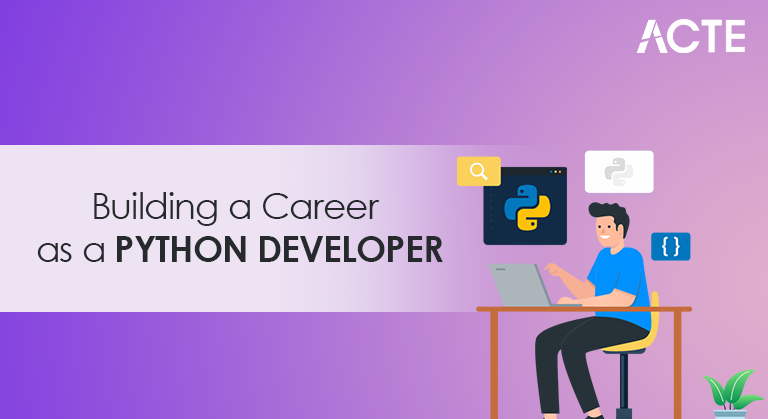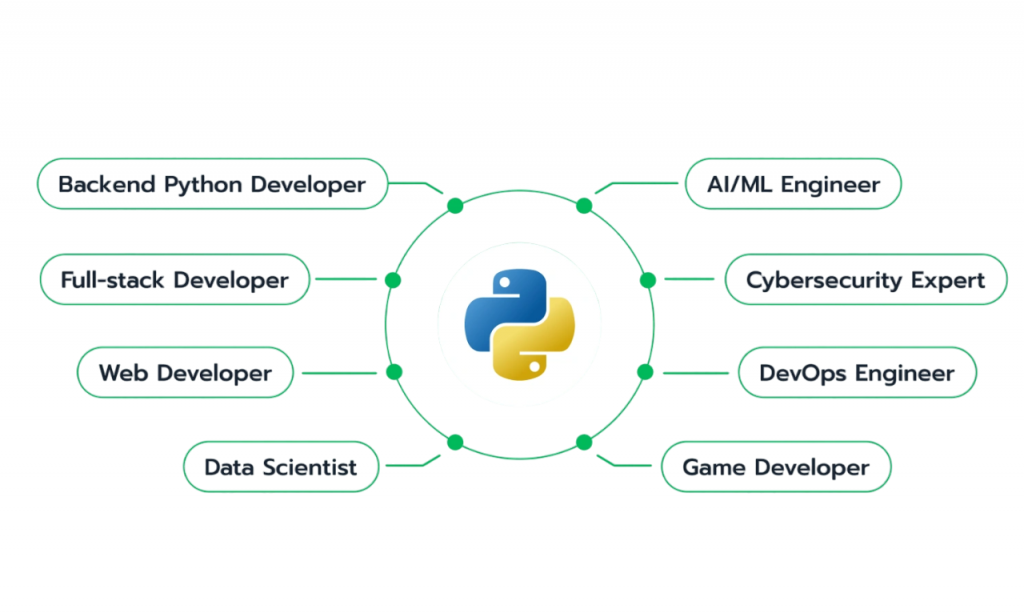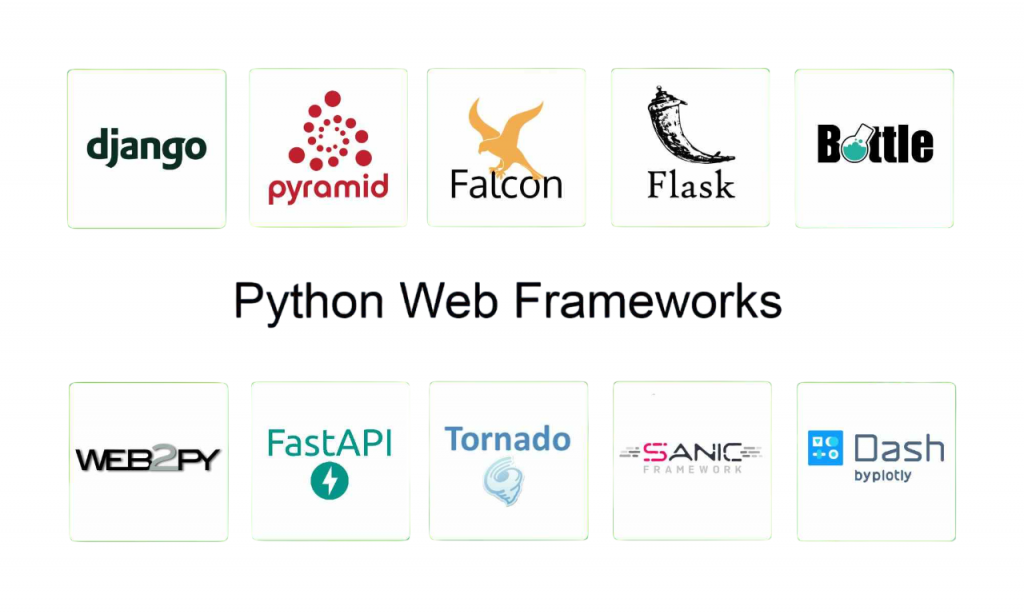
- Introduction to Python and Its Career Potential
- Understanding the Role of a Python Developer
- Learning Core Python Concepts and Syntax
- Mastering Object-Oriented Programming in Python
- Exploring Python Frameworks (Django, Flask, etc.)
- Building Real-Time Projects and a Strong Portfolio
- Version Control and Collaborative Development (Git/GitHub)
- Conclusion
Introduction to Python and Its Career Potential
Python is one of the most versatile, in-demand, and beginner-friendly programming languages in today’s tech landscape. Its readability, simplicity, and broad application areas make it a top choice for software development, data science, machine learning, automation, and more. Whether you’re a fresher, a student, or an experienced professional switching domains, learning Python opens doors to a wide range of high-paying job opportunities in startups, MNCs, and freelancing markets. With the IT industry booming and emerging technologies becoming the backbone of digital transformation, Python continues to Python Training dominate. Python’s syntax closely resembles the English language, making it easier to learn and apply in real-world scenarios. This simplicity is complemented by its powerful libraries and community support, offering tools and frameworks for nearly every task imaginable. Python serves as the gateway to a multitude of roles from data scientist and software engineer to automation expert and AI researcher. Python is one of the most popular and versatile programming languages today, known for its simplicity, readability, and broad application areas. It is widely used in web development, data science, artificial intelligence, automation, and more. Python’s growing ecosystem of libraries and frameworks makes it an excellent choice for both beginners and experienced developers. Due to its high demand across industries, proficiency in Python opens up numerous Python Serialization career opportunities, from software development to data analysis and machine learning roles. As businesses increasingly rely on data-driven solutions, Python’s relevance and career potential continue to expand rapidly.
Do You Want to Learn More About Python? Get Info From Our Python Online Training Today!
Understanding the Role of a Python Developer
Role of a Python Developer writes, tests, and debugs code written in Python. They work on tasks ranging from web development and scripting to artificial intelligence and data engineering. Their roles may include backend programming, automation, API development, data processing, or integration of third-party services What is pip . Depending on the project, a Python developer may also be involved in software design, requirement analysis, and deployment processes.

Python developers must understand not only the syntax but also the context in which the language is used. They may be responsible for building server-side logic, implementing security, developing user-facing features, managing data storage solutions, or integrating with external systems. Moreover, in startup environments, Python developers are expected to wear multiple hats, often participating in product design, DevOps tasks, and user testing. Strong communication skills and the ability to work collaboratively in agile environments are also essential.
Learning Core Python Concepts and Syntax
- Understand Python’s basic syntax including indentation and variable declarations
- Learn data types such as integers, floats, strings, lists, tuples, and dictionaries
- Master control flow with conditionals (if, else, elif) and loops (for, while)
- Get familiar with functions, including defining, Average Annual Salary of a Python calling, and passing arguments
- Explore Python’s handling of exceptions and error management with try-except blocks
- Study modules and packages for code organization and reuse
- Understand file handling techniques to read and write data
- Practice object-oriented programming basics like classes, objects, inheritance, and methods
Mastering Object-Oriented Programming in Python
Mastering Object-Oriented Programming (OOP) in Python is crucial for developing well-structured, maintainable, and scalable software. Python supports core OOP principles such as encapsulation, inheritance, polymorphism, and abstraction, which help organize code around objects representing real-world entities. By defining classes, developers can encapsulate data attributes and related behaviors (methods) into reusable blueprints, making programs modular and easier to debug. Inheritance enables new classes to extend existing ones, promoting code reuse and logical hierarchy, while polymorphism Python Training allows methods to operate differently based on the object context. Python’s simple, readable syntax simplifies implementing these concepts, even for beginners. Special methods like __init__ (constructor) and __str__ (string representation) enhance class functionality, while magic methods enable operator overloading for more intuitive object interaction. Mastery of OOP also facilitates working with popular Python frameworks such as Django and Flask, which heavily rely on object-oriented patterns. Additionally, understanding OOP principles is invaluable when collaborating in teams or contributing to large codebases, as it promotes consistent design and improves code maintainability. Overall, becoming proficient in Python’s OOP features empowers developers to build complex applications efficiently and lays a solid foundation for advanced programming concepts.
Want to Pursue a Python Master’s Degree? Enroll For Python Master Program Training Course Today!
Exploring Python Frameworks (Django, Flask, etc.)
Python’s popularity in web development is significantly supported by robust frameworks:
- Django: A full-stack framework ideal for building scalable and secure applications. It comes with built-in admin panels, authentication, ORM, and middleware.
- Flask: Lightweight and flexible, Input in Python Flask is great for small projects and APIs. It gives developers full control over architecture.
- FastAPI: A modern framework for building APIs, known for speed and automatic documentation using OpenAPI.

By working with these frameworks, you gain real-world exposure to HTTP protocols, routing, templating, RESTful design, and MVC architecture. Try building blog systems, ecommerce sites, or REST APIs to master these tools.
Building Real-Time Projects and a Strong Portfolio
- Choose projects that solve real-world problems or automate tasks
- Incorporate technologies relevant to your target job (e.g., web frameworks, APIs)
- Showcase a variety of skills: front-end, back-end, databases, and testing
- Use version control (Git) to track your work and demonstrate collaboration skills What is PyCharm
- Write clean, well-documented code to highlight professionalism
- Deploy projects online using platforms like GitHub, Heroku, or AWS
- Include detailed README files explaining project goals, features, and setup instructions
- Continuously update your portfolio with new projects to reflect your growth and expertise
Version Control and Collaborative Development (Git/GitHub)
Version Control and Collaborative systems like Git are essential tools for managing changes in code during software development. Git allows developers to track revisions, collaborate seamlessly, and maintain a complete history of project modifications. GitHub, a popular platform built on Git, facilitates collaborative development by enabling multiple contributors to work on the same codebase, review changes, and merge updates efficiently. Using Git and GitHub, teams can avoid conflicts, Python List vs Tuple Guide revert to previous versions if needed, and implement workflows such as branching and pull requests to organize development efforts. Mastering these tools not only improves code quality but also demonstrates professionalism and teamwork skills highly valued in the industry. Version control allows developers to track changes, collaborate in teams, and revert errors. Use tools like GitKraken or Git CLI for daily commits. Collaborating on open-source repositories also teaches you about code reviews, branching strategies, and issue tracking. These experiences mirror real-world enterprise development.
Preparing for a Python Job? Have a Look at Our Blog on Python Interview Questions and Answers To Ace Your Interview!
Conclusion
In conclusion, a solid understanding of databases and APIs is fundamental for building modern, efficient, and scalable applications. Databases provide the backbone for storing and managing data, while APIs enable seamless communication between different software components Python Training and external services. Mastering both SQL and NoSQL databases allows developers to choose the best tools suited to their project needs, whether structured or flexible data handling is required. Similarly, proficiency in working with APIs both consuming and creating opens up endless possibilities for integrating diverse functionalities and enhancing user experiences. Together, these skills empower developers to create robust, dynamic applications that meet today’s complex technological demands.


